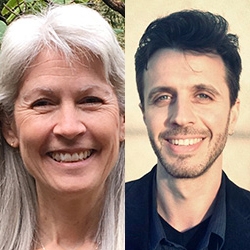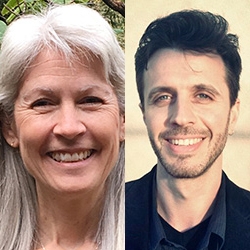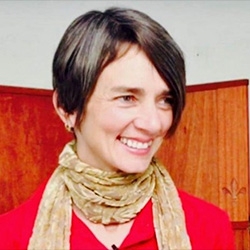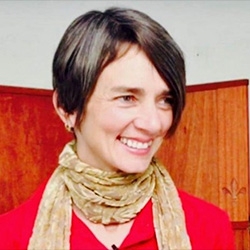

Search Results: thoughts
-
Trainer Tip: It's impossible to value other people’s needs and remain compassionate if we simultaneously harbor judgments. If we're willing to shift this behavior we can translate our judgments into acknowledging how something affects us. Once I got into the habit of this, my judgments began to subside dramatically. It became easy to love people and feel compassion for them, and I experienced a freedom I had never known before.
-
Trainer Tip: When someone is unresponsive it can be an opportunity to bring in more presence and connection through empathy. They may be worried that if they speak they'll say something they'll regret. Or they may want to know that their needs matters as much as yours. They may also need more space to clarify their thoughts.
-
Trainer tip: Judging others can affect our ability to communicate effectively with that person, or enjoy the relationship. Translating the static judgments (enemy images) we have of others into our own and others' feelings and needs can help us move into greater understanding, healing, and relief -- which can foster compassion and connection. Read on for more.
-
- Integrate the underlying principles of NVC into your daily life
- Create a daily practice of self empathy and connecting to needs
- Strengthen your own personalized set of NVC skills
- Increase your sense of power in the world
- Deepen connection with yourself and those in your life
-
Listen as Mary Mackenzie shares an eight step path to create your own NVC learning activities, based on your own NVC learning experience. In this session, Mary uses the value of requests and observations as teaching examples.
-
In this book excerpt, Kathleen and Jared offer a path to reach deeper clarity, distinguishing between universal needs and strategies.
-
In this book excerpt, Kathleen and Jared offer a path to reach deeper clarity, distinguishing between revealing ourselves and projection.
-
- Access, follow and train your intuition: how to know without knowing;
- Navigate difficult situations with care for all through an active awareness of your own power, as well as other sources of power in the room;
- Remain aware of who speaks and who doesn’t, of those whose pain is invisible – and what you can do about it;
- Walk towards someone presenting a challenge to a group you are facilitating, while continuing to hold care for the entire group, and more.
-
There are many polarizing issues we can resist and fight over. The word "resistance" can mean fighting against what we don’t agree with in counterproductive ways. It can also be the illusion and futility of mentally fighting against reality of 'what is'. But acceptance, non-resistance, of what is doesn’t mean powerless resignation. Another way to resist is to accept and love whole-heartedly, with empathy and care for the people doing the things we are resisting.
-
The American mythos of Independence Day is that liberty, equality, and opportunity are for all. Yet since the country's formation, these needs have been for some at the expense of others. It started with the brutal robbery and genocide of Native Americans and slavery of Africans. And this theme continued for generations in various forms, including how we related to other peoples, countries, and the ecosphere. To achieve true justice, liberty, and opportunity for all we may need to overcome the ego's sense of separation. Compassionate noncooperation may also be key.
-
"Falling out of love" is a misleading concept that can lead to feelings of helplessness in relationships. The initial intense phase of love gradually gives way to the need for intentional effort and communication. Unrealistic relationship expectations can erode connection, causing the perception of falling out of love. To address this, we can ask key questions and seek clarity to attend to unmet needs and maintain a healthy connection.
-
Empathy is a form of attunement. Empathy is giving your compassionate curiosity by guessing another’s feelings and needs. Consider how you live or relate to each of these 12 essential aspects of empathy. Some of them mention how we can offer empathy without abandoning ourselves, how empathy isn't always the best response, and how "Empathy can be offered when you disagree with another’s opinion, memory, or perspective."
-
What does nonviolence have to do with group facilitation?
Miki Kashtan believes that nonviolence is a way of being and living that orients us in all our thoughts, words and deeds toward the integration of truth, love and courage. All nonviolent individual and collective actions are aimed at preserving what serves life and challenging what does not. Facilitation is one clear path for bringing nonviolence to the world!
How can we act now, as facilitators, as if the world of our dreams, the Beloved Community, is already in place?
-
- 3 full-length courses to deepen your empathy practice
- Learn your body’s “language” and how to listen deeply to it
- Quickly reconnect and return to empathic presence when you are triggered
- Enhance your listening skills and experience greater ease and joy in all your interactions
-
Little negative impacts can become big when left unattended. Watch for things like using a sharp tone, choosing not to share something, going along with something when you don’t really want to, trying to convince your partner, impulsively turning away, shrinking, losing access to parts of yourself, hiding, daydreaming about a different life, and judgmental thoughts. Instead, shift the dynamic: take responsibility, provide empathy, and commit to change.
-
Most of us subject ourselves to so many painful mental jabs and they seldom stimulate helpful change. We can be like a frustrated animal trainer repeatedly whipping an animal, without ever helping the animal to understand what behavior is wanted or offering encouragement. Instead, punishing thoughts can be stepping stones to awareness. We can focus on sensing what we're really aspiring to. This is more likely to eventually produce sustainable change that'll serve us better.
-
When asking for respect it helps to first get clear about your interpretations of other's behavior. You can do this by asking about the other's intentions before believing your thoughts. You can also make a clear request for what specifically you want to see happen instead. Read on for more.
-
Use this exercise to identify what state you're in at any moment, and as an exercise to grow capacity for self-awareness and self-compassion. Identify what happened, thoughts, sensations, feelings, longings, etc. Includes a table that outlines three states of being: Protective/Defensive, Vulnerability, Essence.
-
Anger, guilt, shame, and shutdown are often based on reactivity and “should” thinking. They narrow and distort perceptions, which can bring more suffering. So instead, feel them without resistance, nor acting on them. Bring clarity by naming your observables and thoughts, plus your underlying vulnerable feelings, needs and self-responsibility. Then mourn what needs were, or are, unmet. Only then choose what actions to meet needs.
-
Relationship repair means building connection and care after disconnect and unmet needs. It requires intention to connect and take responsibility for your behavior by naming what didn’t work, offering empathy, and making a plan to do something differently next time. When you have enough empathy to find care and curiosity for them, reflect the other person's observation, thoughts, feelings, needs and requests. Focus on this more than on details of the event.

Quick Links
Subscription Preferences
Stay In Touch!
Looking for ways to keep up with NVC Academy news, get special offers, free resources, or words of inspiration? Here are five ways to stay engaged:




















